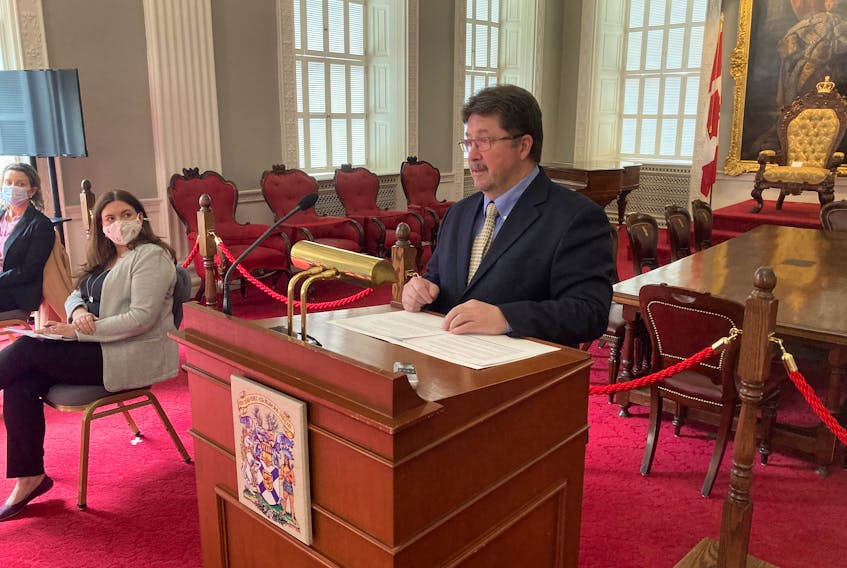A well-financed campaign that convinced many Nova Scotian landowners that the province was coming to take control over their land had its desired effect. Under pressure from private landowners, the Rankin government folded like cheap lawn furniture.
The intent of the Biodiversity Act – the source of the landowners’ fears – was, according to Lands and Forestry Minister Chuck Porter, purely to conserve and sustain the province’s rich natural biodiversity. It seeks to do that on private land through co-operative agreements with landowners.
The bill would also have allowed the province, in rare emergency situations, to issue an order to protect biodiversity – including on private land – if it was under immediate threat. Additionally, the Act named offences – like introducing invasive species into Nova Scotia – and, of course, there were penalties attached to those offences.
But late Tuesday, the province issued a news release that was tantamount to unconditional surrender to the pressure campaign. The government said it will remove the power to issue emergency orders from the bill along with any mention of offences or penalties. Those provisions seemed to be at the heart of the campaign against the bill.
The changes effectively limit the scope of biodiversity protection to Crown lands – about 30 per cent of Nova Scotia’s land mass – except when private landowners agree to collaborate with the province and create biodiversity management zones.
But even more significant than the government gutting its own bill, is the manner in which it was convinced to do so.
The campaign against the Biodiversity Act – a campaign characterized by the bill’s supporters as misinformation and fear-mongering – was ostensibly run by a group calling itself the Concerned Private Landowners Coalition, but Forest Nova Scotia, the industry association that advocates and lobbies on behalf of the province’s forestry sector, was the money and power behind the coalition curtain.
The campaign actively sought to drive a wedge between rural and urban Nova Scotians with stuff like this, taken from the coalition’s website:
“Bill 4, the Biodiversity Act is a dream of Halifax Activists, (who) have been trying for a decade to gain full control of any land use activities in Nova Scotia. That’s what this is all about.”
Really? Imagine a decade-long conspiracy among “Halifax activists” to gain full control of any (and presumably, all) land in the province. It boggles the mind mostly because it never existed anywhere but in the coalition’s propaganda.
Not only did the Rankin government lack the courage of its convictions – to protect biodiversity, as per the original bill – but it lacked the stomach for a fight, even when the other guys were misrepresenting the effect and the intent of the government’s bill.
But that wasn’t all. The coalition told Nova Scotia’s landowners that this one bill would limit how they can use their land and give those dreaded “activists” the tool they need to “harass landowners and stop all agriculture, recreational activity, forestry, hunting and fishing on private lands.”
There is nothing in the bill that suggests any of those things could or would happen, but the campaign worked, the damage was done, and the Liberal government, spooked by the frightened, angry landowners, ran for cover.
Not only did the Rankin government lack the courage of its convictions – to protect biodiversity, as per the original bill – but it lacked the stomach for a fight, even when the other guys were misrepresenting the effect and the intent of the government’s bill.
"Listening to the concerns of my caucus members who have been speaking to their constituents contributed to these changes," Premier Iain Rankin said in the news release.

In other words, the Liberals got the signal loud and clear that there’d be a steep political price to pay if the bill passed as introduced.
While the government wouldn’t fight for its own legislation, a few of the aforementioned activists did. They cobbled together enough bucks to run one ad trying to dispel the misinformation in the coalition’s ads, but they were hopelessly outmatched by the considerable cash available to Forest Nova Scotia.
It’s been suggested that Rankin is no match for Forest Nova Scotia, either.
Pulling the teeth from the Biodiversity Act isn’t the first time he’s appeared malleable to the interests of the big players in Nova Scotia’s forestry sector.
Critics point out that Rankin was the minister responsible while the Lahey report, which advocates ecological forestry practices, languished for two years, with very little progress on the reforms Bill Lahey recommended and the government accepted. The slow implementation of Lahey, critics say, allowed industrial forestry – clearcutting – to continue virtually unabated.
Despite those apparent failures, Rankin retains the often grudging support of many of those Nova Scotians the coalition portrays as wild-eyed activists.
The premier advocates strong measures to reduce greenhouse gas emissions, has promised to accelerate the implementation of the Lahey report and to protect the places still awaiting protection in the parks and protected areas plan.
He will be forgiven – even by many of the so-called activists – for buckling under to industry pressure and gutting the Biodiversity Act, but only if he follows through on the promises to speed up implementation of Lahey and finish the job on protected places.









